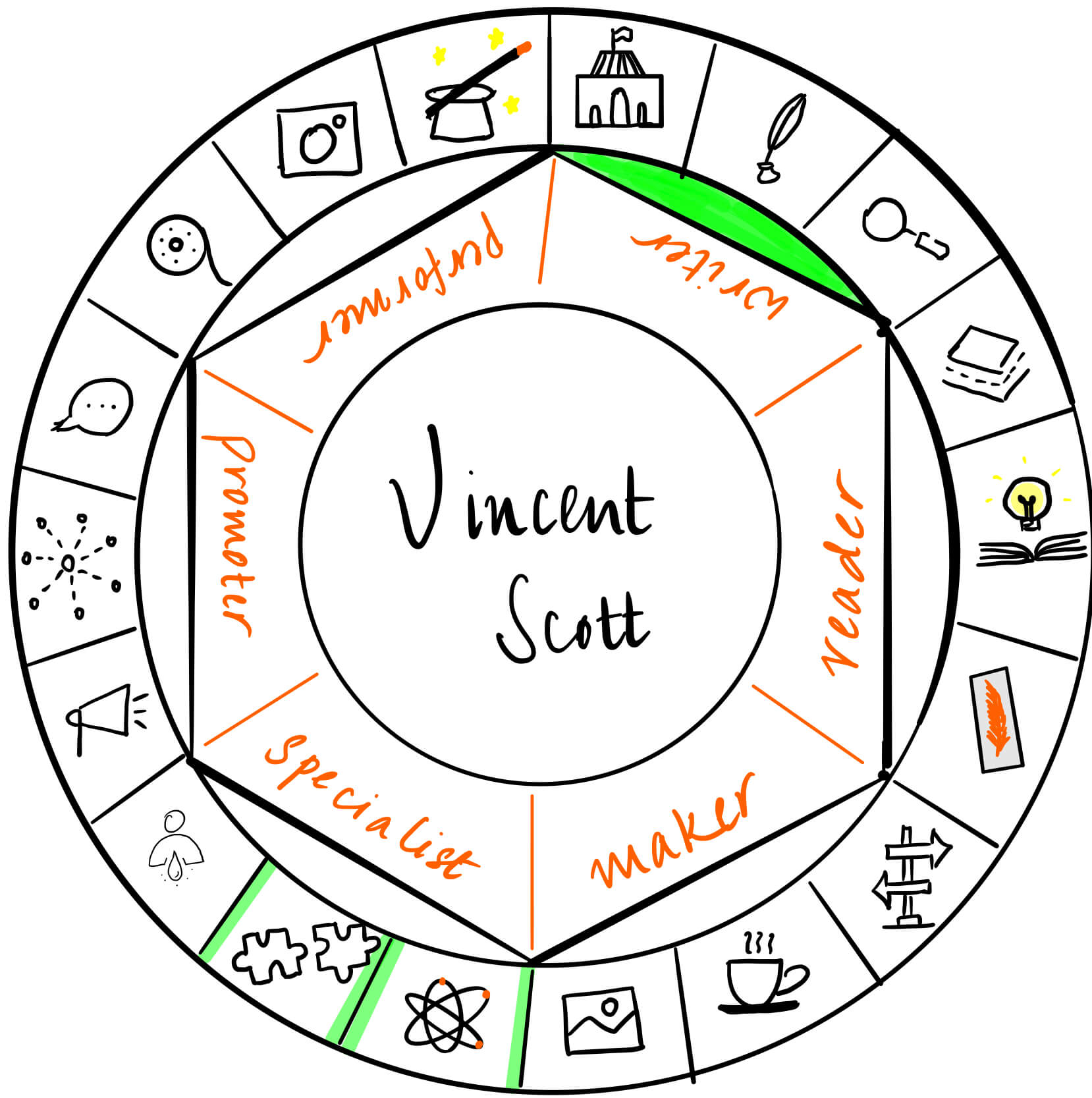
Today I am quite excited to host Vincent Scott on Creator’s Roulette. I am a huge fan of science fiction but I come to this genre with some ideas on what a book in it should look like. I have been hestitant to pick up comedy or humerous books and that is why I inivted Vincent to enlighten me a bit. As a comedy science fiction writer, he has some great insights. In other matters, if you love green tea, I am sure you will get along with him just fine! 🙂
His new novel The Hereafter Bytes is being launched via Kickstarter to raise funds for a full release later in 2020. The campaign runs from March 11th to April 1st and can be found here. Let’s hear from Vincent!
So a Robot Walks into a Bar…

A couple years back, I set out on an ill-advised endeavor. I decided I wanted to try my hand at melding sci fi and comedy. How hard could it be? People only spend years learning to write comedy and years learning to write sci fi. Let’s slap these two together. The book that would come from that, The Hereafter Bytes, was one of the hardest I’ve ever written, and unreservedly the most satisfying writing experience of my life thus far.
On World Building in Sci fi Comedy
This is how I combine the heightened aspects of sci fi with the heightened tone of comedy while world-building.
Developing an intuitive science fiction world is serious business. Ok, maybe not serious, but pragmatic. The experience in my life that’s helped most with this process is travel. When you bounce around the world for a bit, you notice all the cultural differences. The unique qualities of a country’s art forms, culinary traditions, and cultural norms leap out at first, but as you travel, you start to notice that all these varied patterns of life are doing the same thing. They’re meeting basic human needs, and those are pretty universal: love, tasty food, comfort, easy transportation, entertainment, community, thought provocation, status, and care when we’re sick. To name a few.
For all that the world can be so incredibly dynamic, human nature is pretty unifying. In order for a science fiction world to feel organic and intuitive, it has to meet those same needs. It can do it in spectacular, bizarre ways, even unhealthy dystopian ways, but ultimately no society functions for long that doesn’t meet those needs, or if it does function through coercion, the audience has to feel the coercive influence on our character. The character not getting their needs met has to be a conspicuous problem in the society.
If these human impulses aren’t addressed, the world a story inhabits feels false. Readers sense that instinctively.
Constructing the fictional world is a little like building a habitat. You’ve got to make sure all the boxes are checked in the human needs department. When I’m world-building, I ask a lot of “How do people …” questions. How do people have fun? How do people get food? How do people get over their break ups? How do people find a job? How do people deal with profound internal philosophical crisis? How do people get high?
Any technological innovation or cultural transformation you come up with that starts from a credible human need will feel more real. More than that, people who have that need will immediately be invested in that feature of your world.
So, you’ve constructed this world of met needs, and you feel a deep sense of connection to the concepts that underpin it. Maybe it’s a world you find harrowing, maybe it’s a world you want to live in, either way, for some strange reason you’ve decided to cross over with the genre that requires that you take very little of the world seriously. Here’s were comedy rears its maniacal head.
When I’m doing comedic world-building the question I’m asking changes. It becomes, “What’s the most ridiculous way someone plausibly could …” Now, here’s the trick. The operative word? Plausibly. You can’t exaggerate science fiction comedically as much as you can the contemporary world. Why? The world is already exaggerated. Science fiction has stretched it in new and interesting directions already. Your audience wants to go along for the ride. They want to be swept away, but even the most imaginative and nuero-plastic reader is going to have a limit. You stretch them beyond relatability and jokes don’t land.
So, while on the ridiculous end of the spectrum, your scifi-comedy world still has to feel, at least distantly, plausible. Not necessarily in terms of how people meet their needs, but in the needs they’re meeting. As readers, we have to recognize ourselves in the ridiculous behavior of a character surrounded by bizarre technology, in a humorously exaggerated world.

On Characters in Sci fi Comedy
Enter stage left: characters. The needs and wants of your characters have to bring the story down to a very human, vulnerable place. You want to make science fiction and comedy come together, no quests to save humanity. Don’t get me wrong, your character can want to save humanity, they can even succeed in doing that, but the drive has to be much more personal. The universe is high concept, the tone is exaggerated comedy, the characters have to feel extra grounded. So go back to those basic needs. When I say basic, I mean primal: love, community, safety, being our better selves, protecting the people we care about, or conversely: pettiness, revenge, greed. A character doing the wrong thing for the right reasons is a tragic character. An antihero or even a villain who does the right thing by accident or under duress, hilarious. You can then layer a grand cause on top of your narrative, but underneath it needs to be, clearly visible, the hominid stumbling about in the dark.
That’s what comedy genre fiction can do better than almost any other genre. It can drive home the absurdity of the world around us. When we can relate to the feelings of a character in a totally foreign bizarre setting, we can take a step back, look at this absurd series of gestures we call civilization, and realize that the way we do things doesn’t necessarily make a lot more sense. And with that gained perspective, we can become emotionally comfortable with asking questions like, how could things be better? Even if the traditions we’re asking that about are ones in which we have a deep emotional investment.
So that’s it. That’s the basics of how and why I like to read and write comedy/genre fiction. I hope it was informative.
Oh, I almost forgot to mention, there also have to be jokes.
If you are a reader: Have you read sci fi comedy? Why are you drawn to this genre?
If you are a writer and write sci fi: How do you approach world-building and characters?
Want to connect with Vincent? Here are ways to find him on Twitter.

Cover Photo by Jeremy Thomas on Unsplash
Lego robot image on Unsplash.
Star Wars storm trooper image no Unsplash.

In terms of basic needs underlying the most extreme absurdities, I’m, of course, reminded of Arthur Dent in the Hitchhiker series. His planet’s been demolished to make way for an interplanetary highway, he’s been backpacking across the galaxy via the most literally improbable transport system ever invented, he’s been held captive by a pair of superintelligent mice who want to lobotomize him for the secrets of the universe…and all the poor man wants is a bloody cup of tea. Is that so much to ask?